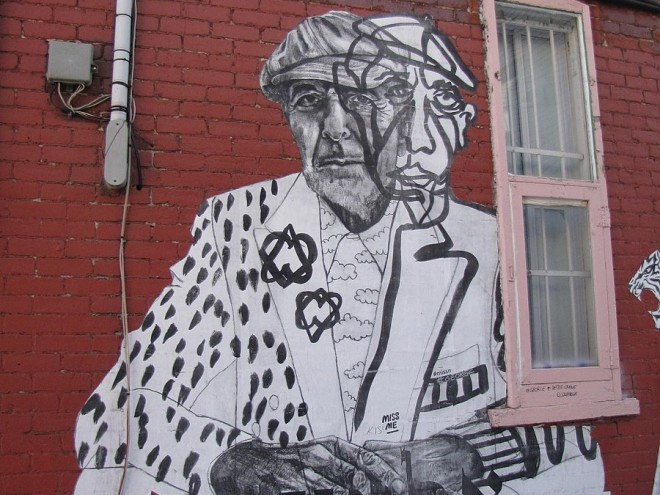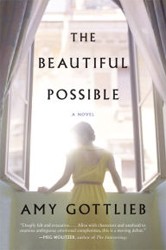Amy Gottlieb is the author of The Beautiful Possible, a novel spanning from 1930s Berlin to the United States in the midcentury to modern-day Jerusalem. Amy is blogging here all week as part of the Visiting Scribe series on The ProsenPeople.
Just about every weeknight throughout my childhood, my mother would clean up from dinner, set up the glass percolator, and settle in for a visit from one of her friends. They would come in rotation, mostly one at a time, a pocketbook dangling from a forearm, an unlit cigarette plucked in anticipation. In the late ‘60s and early ‘70s, these beautiful, perceptive women were waking up to a sense of sexual and personal possibility, yet their roles as traditional wives and mothers kept them from fulfilling their deeper yearnings. The character of Rosalie in The Beautiful Possible derives from the voices of these women and the suburban setting of Briar Wood and the synagogue-that-is-no-longer-a-tent owes much to my childhood.
 I was never barred from the intimacies shared at our large kitchen table, and would drop everything to listen in. The conversations were a pastiche of domestic advice, juicy gossip, existential longings, and whispered secrets — laced with copious laughter and wit. The fashions and mores shifted over the years: a patent leather pocketbook would morph into a macramé tote holding a water pipe and a stash of weed purchased from a cleaning woman. As their children grew, their nascent feminist yearnings grew more furtive; they marveled at the friend who finished college and graduate school, and they passed around a copy of The Feminine Mystique.
I was never barred from the intimacies shared at our large kitchen table, and would drop everything to listen in. The conversations were a pastiche of domestic advice, juicy gossip, existential longings, and whispered secrets — laced with copious laughter and wit. The fashions and mores shifted over the years: a patent leather pocketbook would morph into a macramé tote holding a water pipe and a stash of weed purchased from a cleaning woman. As their children grew, their nascent feminist yearnings grew more furtive; they marveled at the friend who finished college and graduate school, and they passed around a copy of The Feminine Mystique.
Two of these friends were named Ruth and they were like second mothers to me. The first Ruth hemmed my skirts and taught me how to use a sewing machine. She never learned how to drive and her hunger for kitchen-table talk was unquenchable; she knew had to ask pointed questions that would keep a conversation unspooling for hours. The other Ruth drove thirty yards from her house to ours and would park two feet away from the curb, impatient to get to the table and start talking. She suffered through an abusive marriage, and for years she would clutch the business card of a divorce attorney she never phoned. Before Rosh Hashanah my mother and the two Ruths would spend a day rolling out dough for kreplach, just as their immigrant mothers had taught them, and on Passover they would take pride in baking mile-high sponge cakes that seemed to reach the ceiling. Their Jewishness had nothing to do with the synagogue or with Torah, but was expressed in their fastidious holiday baking, bar mitzvah preparations, and in conversations that were tinged with a mixture of cynicism, doubt, wisdom, and deep love.
In 1972, my father died of a sudden heart attack, and the kitchen table became a gathering place for grief and new kinds of revelations. My mother eventually landed a job, remarried, and found fulfillment in her new life. Friendships inevitably realigned and the two friends named Ruth no longer visited. My mother took up quilting, and for the next twenty years the table would become the gathering place for women who crafted, their busy hands arranging fabrics in patterns of flying geese and Irish chains.
 In time, the two women named Ruth moved to other corners of the country and eventually passed on. The quilters relocated to warmer climates. My mother is now 86, and every week she and I sit at the same kitchen table and talk about the two Ruths. She shares stories I hadn’t heard before, embellishes the legendary ones, and adds a new level of commentary. “We wanted everything,” she recently told me. “We wanted this life and we wanted something else too.” This is Rosalie’s conflict, and she was the character I knew most intimately, as I had heard the cadence of her voice all my life. I am grateful for my mother for allowing me a place at the table; I was once a silent daughter who eavesdropped on their intimate conversations, but eventually I added my voice to theirs and wrote them a book.
In time, the two women named Ruth moved to other corners of the country and eventually passed on. The quilters relocated to warmer climates. My mother is now 86, and every week she and I sit at the same kitchen table and talk about the two Ruths. She shares stories I hadn’t heard before, embellishes the legendary ones, and adds a new level of commentary. “We wanted everything,” she recently told me. “We wanted this life and we wanted something else too.” This is Rosalie’s conflict, and she was the character I knew most intimately, as I had heard the cadence of her voice all my life. I am grateful for my mother for allowing me a place at the table; I was once a silent daughter who eavesdropped on their intimate conversations, but eventually I added my voice to theirs and wrote them a book.
Amy Gottlieb’s fiction and poetry have been published in many literary journals and anthologies. She has received a Literary Fellowship and Residency from the Bronx Council on the Arts, and an Arts Fellowship from the Drisha Institute for Jewish Education. She lives in New York City.
Related Content:
- Ronna Wineberg: Family Histories and Fiction
- Anne Cherian: Wandering Mother, Wondering Daughter
- Tehila Lieberman: Double Vision
Amy Gottlieb is the author of the novel The Beautiful Possible, which was a finalist for the Edward Lewis Wallant Award, Harold Ribalow Prize, and a National Jewish Book Award. Her poetry has appeared in On Being, Ilanot Review, One (Jacar Press), SWWIM, Bloomsbury Anthology of Contemporary Jewish American Poetry, and elsewhere. She lives in the Bronx.




